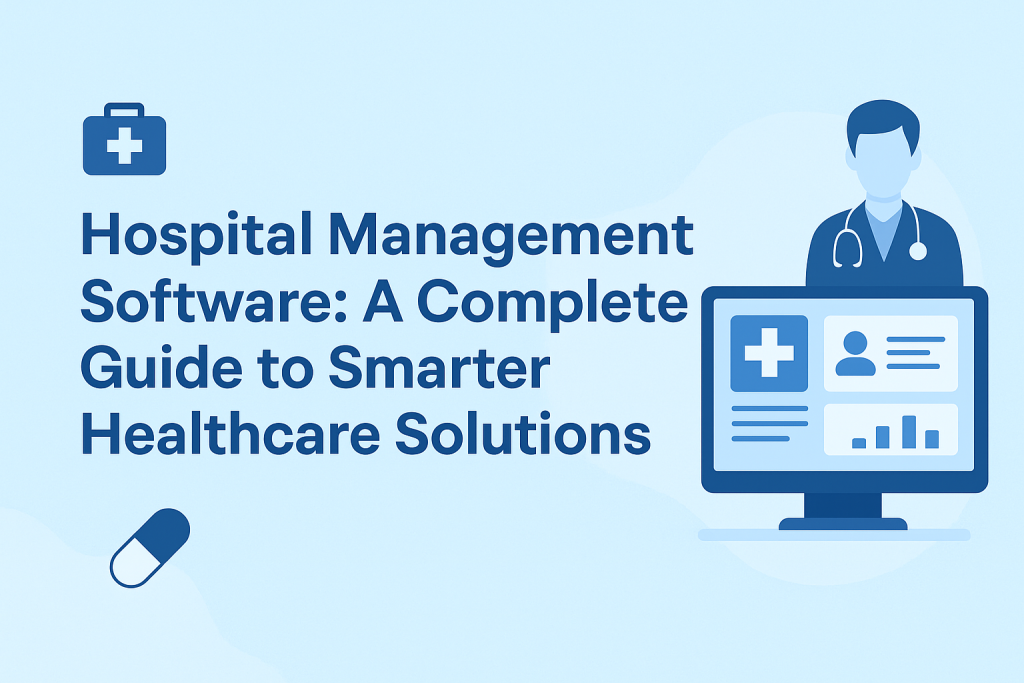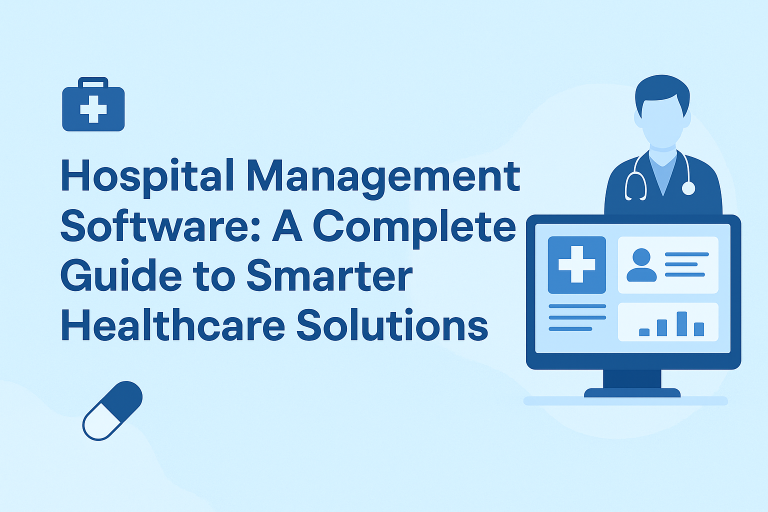One of the most important facets of society has always been the healthcare sector. However, as patient numbers grow, hospitals expand, and the demand for accuracy, efficiency, and security increases, traditional paper-based systems no longer meet the need. This is where hospital management software steps in. It revolutionizes how hospitals, clinics, and healthcare providers operate every day.
In this detailed guide, we will explore what hospital management systems are, why they matter, and how they integrate with other solutions like hospital software, pharmacy management software, and laboratory software to deliver better patient care and smoother operations. If you are a healthcare provider, administrator, or even a patient curious about how technology shapes healthcare, this article serves as your complete reference.
What Is Hospital Management Software?
At its core, hospital management software provides a digital solution to manage end-to-end hospital operations. It covers patient registration, billing, appointment scheduling, pharmacy integration, laboratory reports, and discharge summaries. With this software, hospitals handle administration quickly and efficiently.
Unlike paper-based systems, hospital software reduces paperwork, eliminates errors, improves communication between departments, and secures patient data. It also combines multiple modules into one centralized system, making it easier for healthcare professionals to access records and make informed decisions.
So, why do hospitals need it today? Let’s find out.
Why Hospital Management Software Matters
The healthcare sector leaves little room for mistakes. Even small errors can cause life-changing consequences. Hospitals that use hospital management software gain critical advantages:
- Improved Accuracy: Digital records cut down manual mistakes.
- Faster Data Access: Doctors view patient histories within seconds.
- Time-Saving: Automated workflows reduce patient waiting times.
- Cost Efficiency: Hospitals save money by reducing paperwork and redundant tasks.
- Compliance: The system supports regulatory requirements for secure data storage and sharing.
Therefore, hospitals that adopt this technology scale their services better and build patient trust more effectively.
Core Features of Hospital Management Software
The real strength of hospital management software lies in its features:
- Patient Registration & Records: Quickly onboard patients and store full demographic and medical details.
- Appointment Scheduling: Streamline booking to cut down waiting times and manage doctors’ schedules.
- Billing & Invoicing: Automate invoices, insurance claims, and payment tracking.
- Pharmacy Integration: Connect with pharmacy management software to manage medicines and prescriptions.
- Laboratory Management: Integrate with laboratory software to deliver real-time lab test results.
- Electronic Medical Records (EMR): Store all patient data in one central system.
- Data Security: Secure patient records from unauthorized access.
- Analytics & Reporting: Provide actionable insights for better decision-making and growth.
Clearly, the software does more than just schedule or bill—it creates a hub for all hospital activities.
Hospital Management Software vs. General Hospital Software
Hospital management software and general hospital software are not the same, despite the fact that many individuals use the phrases interchangeably. General hospital software usually refers to standalone tools, such as billing or reporting applications.
Hospital software, however, integrates all those tools into one unified platform. This integration avoids duplication, eliminates data silos, and improves communication across departments.
Therefore, when hospitals move toward digitization, choosing management software proves far more beneficial than depending on isolated hospital software solutions.
The Role of Pharmacy Management Software in Hospitals
Pharmacies remain central to patient care. Without technology, staff members frequently become overwhelmed with managing medication inventories, verifying prescriptions, and eliminating outdated medications. Pharmacy management software solves these challenges.
Pharmacy management software, when combined with hospital administration software, allows:
- Real-time inventory tracking.
- Validation of prescriptions from doctors’ digital records.
- Alerts for low stock or upcoming expiry dates.
- Automated billing connected to patient records.
As a result, this ensures patients receive the right medicines on time, strengthening overall hospital efficiency.

Importance of Laboratory Software in Hospital Operations
Diagnostics form the backbone of modern healthcare. Blood tests, imaging, and pathology reports often make the difference between life and death. Laboratory software, when integrated into hospital software, plays a key role.
It delivers several benefits:
- Faster test processing through automation.
- Error-free digital reporting.
- Seamless integration with doctors’ dashboards for instant results.
- Long-term data tracking for patient history.
With laboratory software, hospitals improve diagnosis speed and accuracy, which leads to better patient outcomes and satisfaction.
Advantages of Implementing Hospital Management Software
Hospitals that adopt management systems enjoy benefits across all levels:
- For Patients: Better care, clearer billing, and shorter wait times.
- For Doctors: Instant access to lab reports, patient histories, and real-time updates.
- For Staff: Simplified workflows and reduced administrative burden.
- For Management: Better cost efficiency, smoother operations, and compliance assurance.
When combined, these advantages improve patient trust and the hospital’s reputation.
Challenges in Adopting Hospital Management Software
Although highly beneficial, implementation still brings challenges:
- Cost of Implementation: Small hospitals sometimes find the initial investment high.
- Staff Training: Employees may resist switching from paper systems.
- Customization Needs: Hospitals often need tailored features.
- Data Migration: Moving old patient records into the new system takes time.
Yet, hospitals that plan carefully and choose the right vendor can overcome these hurdles.
How to Choose the Right Hospital Management Software
When selecting the best system, hospitals should consider:
- Scalability: Can it grow with the hospital?
- Integration: Does it work seamlessly with pharmacy and laboratory modules?
- User-Friendliness: Is it simple for employees to understand and utilize?
- Security Features: Does it comply with healthcare data protection regulations?
- Vendor Support: Does the provider offer training and long-term support?
Ultimately, taking time to evaluate these factors ensures the hospital invests in a system that serves its long-term goals.
The Future of Hospital Management Software
Technology is advancing rapidly, and so are hospital systems. Emerging trends include:
- Artificial Intelligence (AI): Analytics powered by artificial intelligence (AI) can be used to forecast patient risks.
- Cloud-Based Solutions: Allowing remote access and better scalability.
- Mobile Integration: Patients and doctors accessing records via apps.
- Telemedicine: Seamless integration of virtual consultations into hospital workflows.
Therefore, the future clearly indicates that management software will continue to be at the heart of modern healthcare systems.
Conclusion
In today’s fast-paced healthcare industry, hospital software has become an essential tool for delivering high-quality, efficient, and error-free services. Moreover, by integrating with specialized solutions like hospital software, pharmacy management software, and laboratory software, hospitals can achieve operational excellence while prioritizing patient care.
Furthermore, transitioning to digital healthcare is not just about adopting new technology—it’s about ensuring better outcomes for patients, staff, and the entire healthcare ecosystem. As a result, hospitals that embrace these solutions will not only thrive today but also be better prepared for the challenges of tomorrow.
FAQs on Hospital Management Software
Q1. What is hospital management software, and why is it important?
Hospital management software is a digital system that helps hospitals manage administrative, financial, and clinical operations more efficiently. It improves workflow, reduces manual errors, enhances patient care, and ensures data security, making it an essential tool for modern healthcare facilities.
Q2. How does hospital software benefit patients?
Hospital software benefits patients by ensuring quick appointment booking, faster billing, secure medical records, better communication with doctors, and reduced waiting times. It creates a more seamless and patient-friendly experience.
Q3. What is the difference between hospital management software and pharmacy management software?
All aspects of hospital operations, such as staff administration, billing, patient care, and recordkeeping, are covered by hospital management software. In contrast, pharmacy management software focuses only on handling prescriptions, stock management, and medicine sales within the hospital or pharmacy.
Q4. Can laboratory software be integrated with hospital management software?
Yes, laboratory software can be integrated with hospital software to automate lab test requests, track results, and update patient records in real-time. This integration ensures smooth communication between doctors, patients, and laboratory staff.
Q5. Can small clinics also use hospital management software?
Absolutely. Hospital management software is scalable, meaning it can be tailored for small clinics, medium-sized hospitals, and large healthcare chains. Even small clinics benefit from features like appointment scheduling, patient history tracking, and billing automation.

